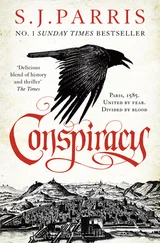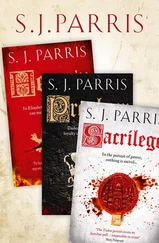‘Bruno? You look troubled.’ Dee’s frown grows fatherly with concern. ‘Is something the matter?’
‘No, no — I heard the date mentioned by one of the embassy servants and wondered why it was important.’ I search his face and am seized by a sudden affection for him; impetuously, I grip him by the shoulders and kiss him on both cheeks. He looks surprised, but pleased. ‘Remember — no mention to the queen of any visions,’ I add over my shoulder, as I turn to go.
I had paid the boatman who brought me to Mortlake to wait, since wherries are harder to come by this far upriver. We have progressed perhaps twenty minutes on our journey back towards London, when I notice another small boat keeping pace with ours at a distance of about fifty yards. It has only one passenger, a man, as far as I can tell, wearing a travelling cloak and a hat pulled down around his face, but they are too far away for me to see him clearly.
‘Has that boat been behind us all the way from Mortlake?’ I ask the boatman, who squints at it from under his cap.
‘That one? Yes, sir — it was moored up just along the bank from where you come down.’
‘All the time I was on shore?’
He shrugs.
‘Couldn’t rightly say, sir. A good part of the time, at least.’
‘With that same passenger? Or did he get on at Mortlake?’
‘Didn’t notice.’
‘But it left at the same time as us?’
‘Must ‘a done, if it’s behind us now.’
‘Slow your pace,’ I instructed. ‘Let them catch us up.’
The boatman obeys me and eases off his oars; the boat behind us appears to do the same, so that the distance remains. I tell my boatman to stop rowing altogether; he complains that the current is too strong and we will be brought into the bank. The other boat moves closer to the opposite side, away from us. The further we travel downriver, the busier the water becomes, but our two boats continue to follow the same course; I crane over the side but still cannot get a good view of the passenger who I am now certain is following me. At Putney, the other ferryman suddenly weaves his craft across the river and pulls it in at the landing stairs; my boatman pulls doggedly onwards, and I can only see the man in silhouette as he disembarks. There is nothing to distinguish him; he appears to be of average height and build, and he keeps his hat pulled down as he climbs the stairs and disappears. Clearly someone was interested in my visit to Dee. I recall the sensation I had of being followed yesterday at Whitehall; could it be the same person? But who would have an interest in my movements, to spend that much time tailing me to Mortlake? A cold shiver prickles at my neck. Unless it is someone who saw me talking to Abigail yesterday and is following me precisely because he fears that she has passed on to me something that she knew. And if that is the case, it means the man I have just seen stepping lightly up the stairs at Putney could only be the killer of Cecily Ashe. If it is so, I think grimly, Abigail may be in immediate danger — as may I, for that matter, though I am probably better equipped to look after myself. Perhaps I should warn her — but how am I to get a message to her at court without arousing further suspicion? I have no means of contacting the kitchen boy who brought her message last time — and no means of knowing whether he might have alerted anyone else to her meeting with me in the first place, intentionally or otherwise.
When the boat has finally delivered me back to Buckhurst Stairs, and I have paid the boatman his considerable fee for the long journey, I return to find Salisbury Court silent, its halls and galleries unaccountably empty. This suits me; I manage to reach my room without being detained by Castelnau’s summons or his wife’s aggressive flirting. But even before I insert the key into the lock, I am struck by a feeling of unease, as vivid as if I had glimpsed a presence in the corridor; I whip around to right and left, but the landing remains as unnaturally still as the rest of the house. Chiding myself for growing skittish, I attempt to turn the key and it will not move. I turn the latch; the door is already open. Every muscle in my body tenses; the hairs stand up on my skin and my hand goes instinctively to the knife I carry at my belt. I left this door locked, I would swear to it on everything I hold dear; I am diligent to the point of obsession in this matter. I have never, in six months, gone out and left my chamber unlocked — there are books and writings in my chest that would not be regarded sympathetically by anyone in this devoutly Catholic household. How naive I have been not to have considered that someone in the house must have a duplicate set of keys for all the rooms. Silently cursing my own stupidity, I slowly ease the door back and then kick it violently, springing over the threshold with my knife drawn.
But the room is empty, untouched, just as I left it, the bed sheets folded back neatly, some papers arranged in two separ ate piles on the writing desk where I had been working, the quills, inkpot and penknife scattered beside them. For a moment, I doubt myself; perhaps in my haste to get to Dee this morning, I really did forget to lock the door. Still the sense of unease persists; I turn slowly, taking in the room, the details of its sparse furnishings, racking my brain to see if anything looks out of place, half expecting some movement out of the shadows. It is only when I cross to the desk that I notice immediately that the papers are out of sequence. Clearly, whoever has been in my room failed to consider that I am famous in France for my prodigious memory as well as my heresy. Quickly I sift through the notes; there is nothing here that is too contentious, some mathematical calculations on the motions of the Moon and the Earth, and a series of diagrams measuring how the heavenly bodies reflect light, but nothing that could have me arrested. Nevertheless, the topmost papers are not the ones I was working on recently. This thought leads me to check the carved wooden chest where I keep my more inflammatory books. The padlock that holds its iron clasps is intact, but there are tiny scuff marks in the dust around it that suggest it has been moved a fraction. Someone has given it some attention very recently.
At the far end of the room there is another chest, somewhat larger, where I keep my clothes. It emits a faint gust of amber when I lift the lid, from the pomander I keep in there to discourage moths. Here too, I see subtle evidence of interference. My clothes have been taken out and replaced, hastily folded. I lift up a fine wool doublet and smooth it down, refolding it carefully. Nothing appears to be missing, but the chest has clearly been searched. This is even stranger; I can see that there might be some among the embassy’s household — Courcelles, for one — who feel they have a right to sneak in and investigate what I read and write under their roof, but I cannot imagine any reason why anyone here would have the slightest interest in looking through my clothes. Only someone who was looking for something very particular would bother to search there.
At least, I think with some relief, as I tuck the doublet back into the chest, I had taken the velvet bag containing Cecily Ashe’s love-tokens with me. This thought makes me freeze for a moment; but that is impossible, clearly. No one in the household could know anything about my presence at Richmond Palace on the night of the murder, nor about my contact with Abigail Morley. Standing, I brush myself down and shake my head briskly, to dislodge such foolish thoughts as if they were flies. The encounter with the man in the boat has made me see shadows where there are none, and even there I have no firm proof that I was followed. Still, I think, as I step out on to the landing and make doubly sure that I lock the door behind me — I have not imagined the intruder in my room, and someone in the embassy knows who it was.
Читать дальше
Конец ознакомительного отрывка
Купить книгу












